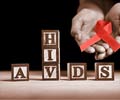A new drug against AIDS tested on monkeys provided an astonishingly effective shield against an animal version of the AIDS virus, said scientists on Wednesday.

"We... show a way to achieve long-lived, effective vaccine-like protection from HIV 1," the main group of viral strains in humans, said study leader Michael Farzan, a professor at the Scripps Research Institute in Florida.
The prototype drug, called eCD4-Ig, comprises two imitations of the receptors, or docking points, where HIV latches on to CD4 cells -- the key defences of the immune cells.
The mimics latch on to the virus, tricking it into prematurely launching the docking procedure.
The virus can only execute the procedure once, rendering it unable to attach to CD4 cells thereafter.
The scientists likened the effect to closing the door to an intruder and tossing away the key.
The paper reported on a 40-week experiment which showed that inoculated animals thrived even after being injected with four times the dose needed to infect macaques in a "control" group.
The search for a vaccine has been one of the most frustrating chapters of the AIDS saga.
Traditional antibody-based candidate vaccines have failed to put up more than a partial shield, partly because of mutations in the stealthy virus.
The new prototype formula, though, targets sites on the virus' so-called Env entry protein that are "highly conserved" -- a scientific term meaning that these sites do not mutate very much.
Lab-dish tests have found that the drug also works on human HIV, which is very close to simian version of the virus.
"Of course, we still need to do further safety studies in both macaques and humans," before any trials can take place, Farzan stressed.
Since 1981, about 78 million people have been infected by the human immunodeficiency virus (HIV), which destroys immune cells and leaves the body exposed to tuberculosis, pneumonia and other opportunistic diseases.
Thirty-nine million have died, according to UN estimates.
Antiretroviral drugs, invented in the mid-1990s, can treat infection, but cannot cure it or prevent it.
Treatment is lifelong and carries side-effects. For many health systems, the drugs bill is spiraling, becoming a major burden to budgets.
Source-AFP
 MEDINDIA
MEDINDIA




 Email
Email









